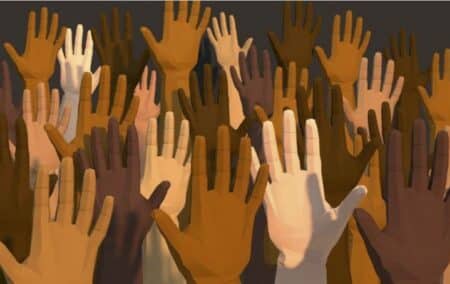In any constitutional democracy, failing governments must ultimately be held to account by the citizenry, and this requires persevering in upholding non-racialism, says the Institute of Race Relations (IRR).
The IRR was responding to debate over police minister Bheki Cele’s meltdown at a public meeting in Gugulethu, and in particular questions about whether Cele’s critic at the contentious community meeting, Ian Cameron, had in any acted inappropriately, given his skin colour.
In a statement, the IRR says: ‘The notion that citizenship is non-racial is a foundational value of South Africa, morally and constitutionally. Most people’s basic values already reflect this point of common sense.”
The statement, headed, ‘Cele’s tirade offers lesson in race relations’, says: ‘Not unusually, the viral video of the week involves an allegation of racism in South Africa, this time from Police Minister Bheki Cele, directed at civil activist Ian Cameron. Cele followed up his accusation by yelling at Cameron at the top of his voice to “shut up or get out”, prompting police to forcibly remove Cameron from the Gugulethu community meeting.’
The IRR highlights the question put to Cameron by eNCA’s Sally Burdett in a live television interview.
Burdett asks: ‘Do you think – and this is perhaps the issue that is hard to talk about – there’s a point at which, possibly – I would like your input – where the free-for-all robust engagement on what is wrong in South Africa and the things that need to change, where that robust engagement ends and white South Africans’ sensitivity to our history of privilege must begin? Do you think about those things, and do you think that could have played a role? And do you think that as a white South African you need to edit yourself and be perhaps sensitive to how you might appear … or do you not subscribe to that at all?’
‘Cameron answered, in part: “No. I went there today as a citizen.”’
He went on to say: ‘I went there today as a citizen, as someone that really cares. I spend a lot time with these families on ground level. Just last week I was the family of Siphokazi Booi. She was dismembered and burnt in a trolley bin. I didn’t see any intervention plan from Cele there, or from the police. In fact, that man that killed her was out on bail after he beat her into hospital.
‘Honestly, I couldn’t care less what race someone is. People are getting killed at alarming rates in South Africa, higher than many war zones in the world. And we have a Minister of Police fighting dirty politics …I am not going to get involved in race issues when I see people being killed at the rate which they are.’
The IRR points out that a statistically significant, demographically representative survey which it commissioned in 2020 ‘found that over 70% agreed that individuals need one another across racial lines to go forward. In addition, crime and corruption were found to be the biggest problems that need to be tackled, after unemployment’.
‘However, most respondents of all races also found that “politicians who are trying to excuse their own failures” use allegations of “racism” and “colonialism” as distractions.
The IRR says: ‘Cameron’s full answer to the question of whether he should edit himself because he is white is emblematic of this.’

